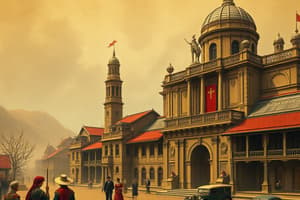Podcast
Questions and Answers
What defines the Prehistoric Era?
What defines the Prehistoric Era?
- Time characterized by urbanization and trade
- Time before written records (correct)
- Era marked by the development of major civilizations
- Period of significant technological advancements
Which historian is known for documenting the Greco-Persian Wars?
Which historian is known for documenting the Greco-Persian Wars?
- Thucydides
- Marc Bloch
- Edward Gibbon
- Herodotus (correct)
Which major event characterized the Medieval Period?
Which major event characterized the Medieval Period?
- The fall of the Roman Empire (correct)
- The Age of Exploration
- The Industrial Revolution
- The Renaissance
What is a primary source in historical research?
What is a primary source in historical research?
What does economic history primarily examine?
What does economic history primarily examine?
Flashcards
Historiography
Historiography
The way historians write and study history, including how they interpret events and sources.
Prehistoric Era
Prehistoric Era
The time before written records, including the Stone Age, Bronze Age, and Iron Age.
Primary Source
Primary Source
Original documents or artifacts from a historical period.
Ancient History
Ancient History
Signup and view all the flashcards
Social History
Social History
Signup and view all the flashcards
Study Notes
Key Concepts in History
-
Definition of History: The study of past events, societies, and cultures, often documented through written records and archaeology.
-
Historiography: The method and practice of writing history, including the interpretation of historical events and sources.
Major Historical Periods
-
Prehistoric Era:
- Time before written records.
- Includes the Stone Age, Bronze Age, and Iron Age.
-
Ancient History (c. 3000 BCE - 500 CE):
- Development of writing, agriculture, and early civilizations (e.g., Mesopotamia, Egypt, Indus Valley, China).
- Key empires: Roman, Persian, and Maurya.
-
Medieval Period (500 - 1500 CE):
- Fall of the Roman Empire and rise of feudalism.
- Spread of major religions (Christianity, Islam).
- Notable events: Crusades, Black Death.
-
Early Modern Period (1500 - 1800 CE):
- Renaissance and Reformation.
- Age of Exploration and colonization.
- Scientific Revolution.
-
Modern History (1800 - Present):
- Industrial Revolution and technological advances.
- World Wars and Cold War.
- Globalization and contemporary issues.
Important Historical Themes
-
Political History: The study of governance, rulers, and political institutions.
-
Social History: Focuses on everyday life, social structures, and cultural practices.
-
Economic History: Examines trade, economics, and resources throughout time.
-
Cultural History: Looks at arts, literature, and philosophies that shape societies.
-
Military History: Analyzes wars, strategies, and the impact of conflict on societies.
Influential Historians
-
Herodotus: Often called the "Father of History," known for documenting the Greco-Persian Wars.
-
Thucydides: Focused on the Peloponnesian War, emphasized critical analysis and primary sources.
-
Edward Gibbon: Known for "The History of the Decline and Fall of the Roman Empire."
-
Marc Bloch: Founder of the Annales School, emphasized social and economic history.
Methods of Historical Research
-
Primary Sources: Original documents, artifacts, and records from the time being studied.
-
Secondary Sources: Analyses, interpretations, or summaries of historical events by later historians.
-
Oral History: Gathering information through interviews and personal testimonies.
Importance of Studying History
-
Understanding Change: Allows insight into how societies evolve over time.
-
Civic Awareness: Informs citizens about their rights, responsibilities, and historical context.
-
Cultural Identity: Helps individuals understand their cultural heritage and identity.
-
Lessons Learned: Provides insights into human behavior and the consequences of actions, informing future decisions.
Definition and Concepts of History
- History involves the exploration of past events, societies, and cultures through documentation, including written records and archaeological findings.
- Historiography refers to the methodology and interpretation involved in writing history, analyzing historical events, and assessing source materials.
Major Historical Periods
- Prehistoric Era: Encompasses time before written records, including the Stone Age, Bronze Age, and Iron Age.
- Ancient History (circa 3000 BCE - 500 CE): Characterized by the emergence of writing, agriculture, and early civilizations like Mesopotamia, Egypt, the Indus Valley, and China. Influential empires included the Romans, Persians, and Mauryan.
- Medieval Period (500 - 1500 CE): Marked by the decline of the Roman Empire, the rise of feudalism, and the spread of major religions including Christianity and Islam. Significant events include the Crusades and the Black Death.
- Early Modern Period (1500 - 1800 CE): Defined by the Renaissance, Reformation, advancements in exploration, and the Scientific Revolution.
- Modern History (1800 - Present): Notable for the Industrial Revolution, two World Wars, the Cold War, and the rise of globalization alongside contemporary challenges.
Important Historical Themes
- Political History: Studies governance, political institutions, and rulers.
- Social History: Examines everyday life, social structures, and cultural practices.
- Economic History: Investigates trade, economics, and resource allocation over time.
- Cultural History: Focuses on the influence of arts, literature, and philosophies on societies.
- Military History: Analyzes warfare, military strategies, and the impacts of conflict on civilizations.
Influential Historians
- Herodotus: Known as the "Father of History"; documented the Greco-Persian Wars.
- Thucydides: Author of works on the Peloponnesian War, recognized for critical analysis and use of primary sources.
- Edward Gibbon: Famous for "The History of the Decline and Fall of the Roman Empire."
- Marc Bloch: Contributed to the Annales School, emphasizing social and economic perspectives in history.
Methods of Historical Research
- Primary Sources: Original documents and artifacts from the relevant historical periods.
- Secondary Sources: Historical analyses and summaries created by later historians.
- Oral History: Collects information through interviews and personal accounts from individuals.
Importance of Studying History
- Understanding Change: Provides insights into the evolution of societies across time.
- Civic Awareness: Educates individuals about rights, responsibilities, and historical context within governance.
- Cultural Identity: Assists in the comprehension of personal cultural heritage and identity.
- Lessons Learned: Offers valuable insights into human behaviors and the repercussions of actions, guiding future decision-making.
Studying That Suits You
Use AI to generate personalized quizzes and flashcards to suit your learning preferences.




